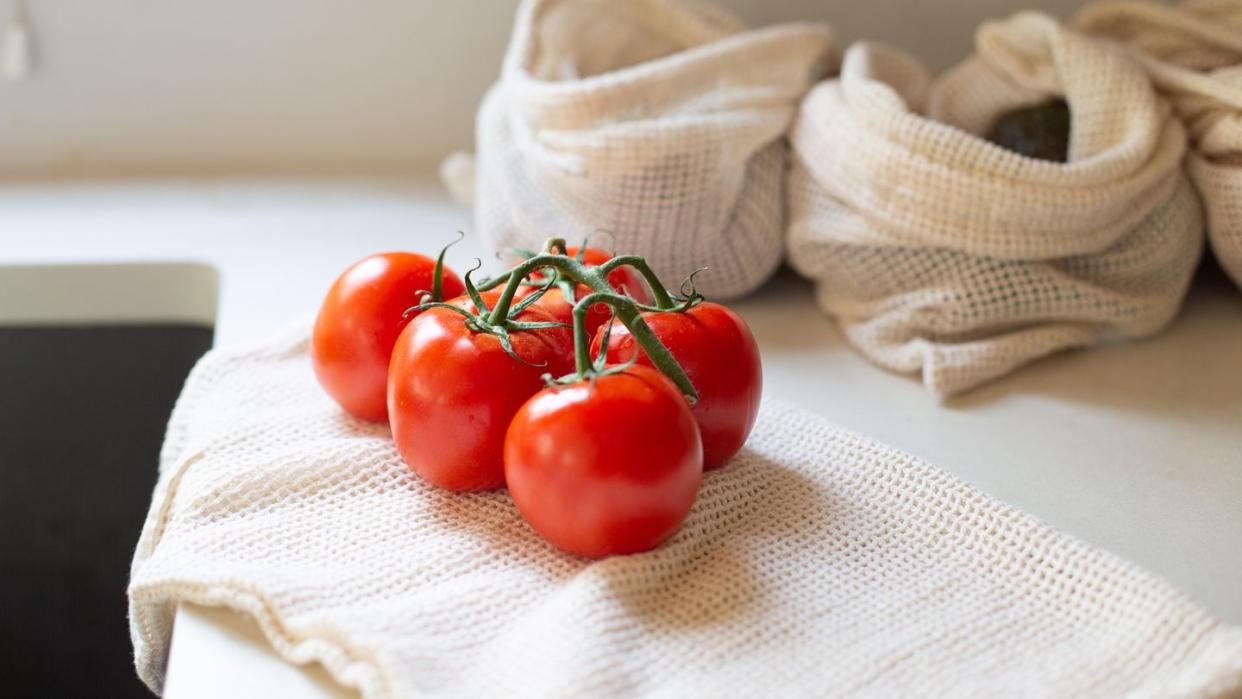Are Tomatoes Bad for Arthritis? Dietitians and Rheumatologists Weigh In

[table-of-contents] stripped
For decades, tomatoes have been positioned as a food that could potentially worsen symptoms of arthritis, a condition characterized by joint pain, stiffness, swelling, warmth, and tenderness that affects one in four U.S. adults, per the Centers for Disease Control and Prevention. The tomato-inflammation link stems from the fruits’ naturally occurring chemicals known for their toxicity (more on that later). But dietitians say there’s no solid evidence that supports omitting a perfectly nutritious food—and its nightshade relatives—from your diet. Ahead, learn whether or not tomatoes are really bad for arthritis, and if they may cause inflammation.
Meet the Experts: Emily Sullivan, R.D.N., registered dietitian for MyFitnessPal; Bianca Tamburello, R.D.N., registered dietitian with FRESH Communications; and Scott Zashin, M.D., a rheumatologist at Dallas Rheumatology Practice.
First, what are nightshades?
“Nightshades refer to a group of plants in the Solanaceae family,” explains Emily Sullivan, R.D.N., registered dietitian for MyFitnessPal. “Among the notable members of this group are eggplants, potatoes, tomatoes, bell peppers, and chili peppers.” All of these veggies get a bad rep because they naturally contain the alkaloids solanine and capsaicin, a group of potentially toxic chemical compounds thought to cause inflammation (though research supporting that is lacking). What many people don’t know is that those compounds likely exist within the veggies to ward off pests and herbivores—and there’s not a high enough concentration within a serving of tomatoes to cause any significant damage to the human body.
“Inflammation may occur with extremely high doses of alkaloids, but the amount of alkaloids consumed by eating ripe and well-prepared nightshade vegetables is safe for most individuals” who don’t have a specific nightshade allergy or sensitivity, Sullivan says.
Do tomatoes cause inflammation?
Autoimmune conditions like rheumatoid arthritis are characterized by inflammation in the body, explains Scott Zashin, M.D., a rheumatologist at Dallas Rheumatology Practice. “Inflammatory cells and proteins attack joints and may cause pain or discomfort, stiffness, damage and possible joint deformity,” he adds. And some foods—namely those that are ultra-processed and contain high amounts of added sugars—are known to exacerbate symptoms, but tomatoes aren’t necessarily one of them.
Despite there being limited research to confirm tomatoes’ toxicity and link to inflammation, some people with arthritis or inflammatory conditions report feeling worse after eating nightshades, per the Arthritis Foundation. “While some individuals with specific health conditions or sensitivities may report symptom relief when avoiding certain foods like nightshades, it’s not a one-size-fits-all recommendation,” explains Sullivan.
In fact, research shows lycopene in tomatoes may help protect against inflammation and chronic disease, not to mention, they offer valuable vitamins and antioxidants, adds Bianca Tamburello, R.D.N., registered dietitian with FRESH Communications. That said, individuals’ varied reactions to the fruit may lie in personal food sensitivities, which is why it’s important to consult a rheumatologist or an R.D. for advice. “They can offer tailored guidance according to individual health requirements, ensuring that any modifications to the diet are safe and balanced,” says Sullivan.
Do tomatoes cause digestive issues?
In addition to causing inflammation, tomatoes, and their fellow nightshades are also rumored to cause digestive upset—alkaloids, again, being the culprit. And once again, Tamburello says there’s no solid evidence to confirm this. In rare cases, green potatoes eaten in large quantities have been known to cause solanine poisoning, resulting in diarrhea, vomiting, and abdominal pain.
Can fasting help reduce arthritic inflammation?
“There’s some research that shows fasting may help control inflammation and lessen arthritic symptoms,” explains Tamburello. “However, there isn’t enough evidence to recommend fasting over the proven benefits of an anti-inflammatory diet packed with foods like fruits, veggies, fatty fish, nuts, and olive oil. Additionally, fasting can be difficult to follow long-term and is not a good fit for everyone.”
Anti-inflammatory foods for arthritis
Fruits, vegetables (especially green leafy veggies), fatty fish like salmon and tuna, nuts, legumes, whole grains, and olive oil are foods well-known to help fight inflammation, says Tamburello. “These foods are staples of the Mediterranean diet which is proven to help combat inflammation,” she adds.
Although tomatoes may be in the clear, there are foods that are more likely to exacerbate inflammation. “Red meat and processed meat, refined carbohydrates, sugary beverages, and fried foods are linked to increased inflammation and should be limited,” Tamburello suggests.
When to adjust your diet for arthritis-related inflammation
If you’re facing persistent symptoms of arthritis including joint pain, stiffness, mobility limitations, and swelling despite medical treatment and lifestyle adjustments, Sullivan says it may then be worth modifying your diet. “However, any dietary changes should be made in consultation with a healthcare professional, especially for those with specific health concerns,” she says. “These professionals can offer personalized advice, guarantee nutritional requirements are met, and oversee the effects of dietary adjustments.”
You Might Also Like


